Lady Questions Herself After Telling Her Partner to Vaccinate His Outdoor Cat Only to Find Out He Considered It "Poisonous"
A great way to maintain your cat's health is to ensure they receive all the required vaccinations. People visit the vet to find out which vaccinations are advised for their cats.
Vaccines help prevent several infectious diseases caused by bacteria and viruses. Millions of cats have been spared illness and death due to vaccinations, making it crucial to continue this approach to ensure cats' protection throughout their lives.
Moreover, vaccinations protect humans from diseases like rabies that can spread from cats to people. Even indoor-only cats need to be vaccinated regularly because there are various situations in which they could become ill.
This includes traveling, boarding, interacting with other cats, bringing a new cat into the house, and viruses on your clothes, among others. The OP understood this, which is why she wanted her partner to vaccinate his outdoor cat.
Both of them are planning to move in together, and he wants to bring his cat. The OP isn't really a pet person, but she finds her boyfriend's cat quite troublesome.
You see, his cat is an outdoor cat that has received little to no treatment from a vet and would become an indoor cat once they move. The OP has told her boyfriend to take his cat to the vet, but his excuse is that vaccines are "poisonous."
Read the entire story for yourself as you scroll down below.
The OP writes
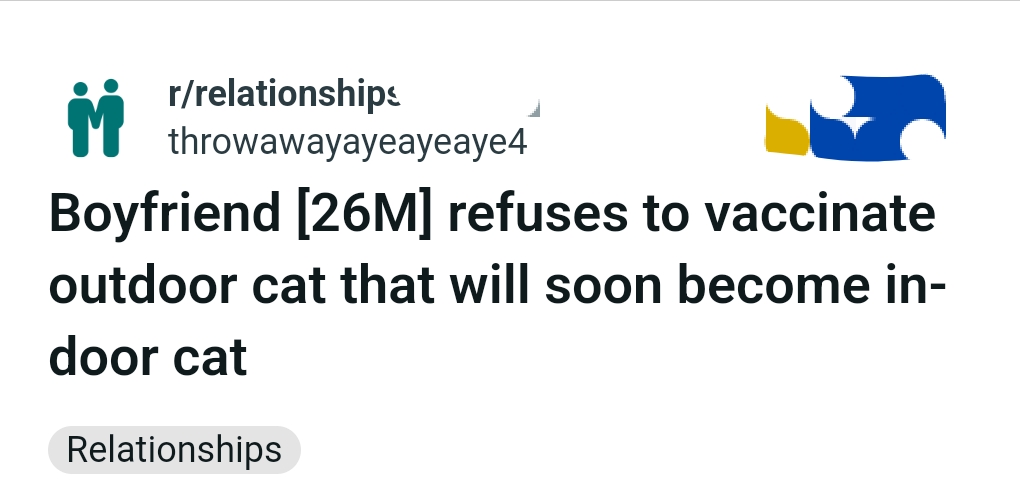
The cat is an outdoor animal that has received little to no treatment from a vet
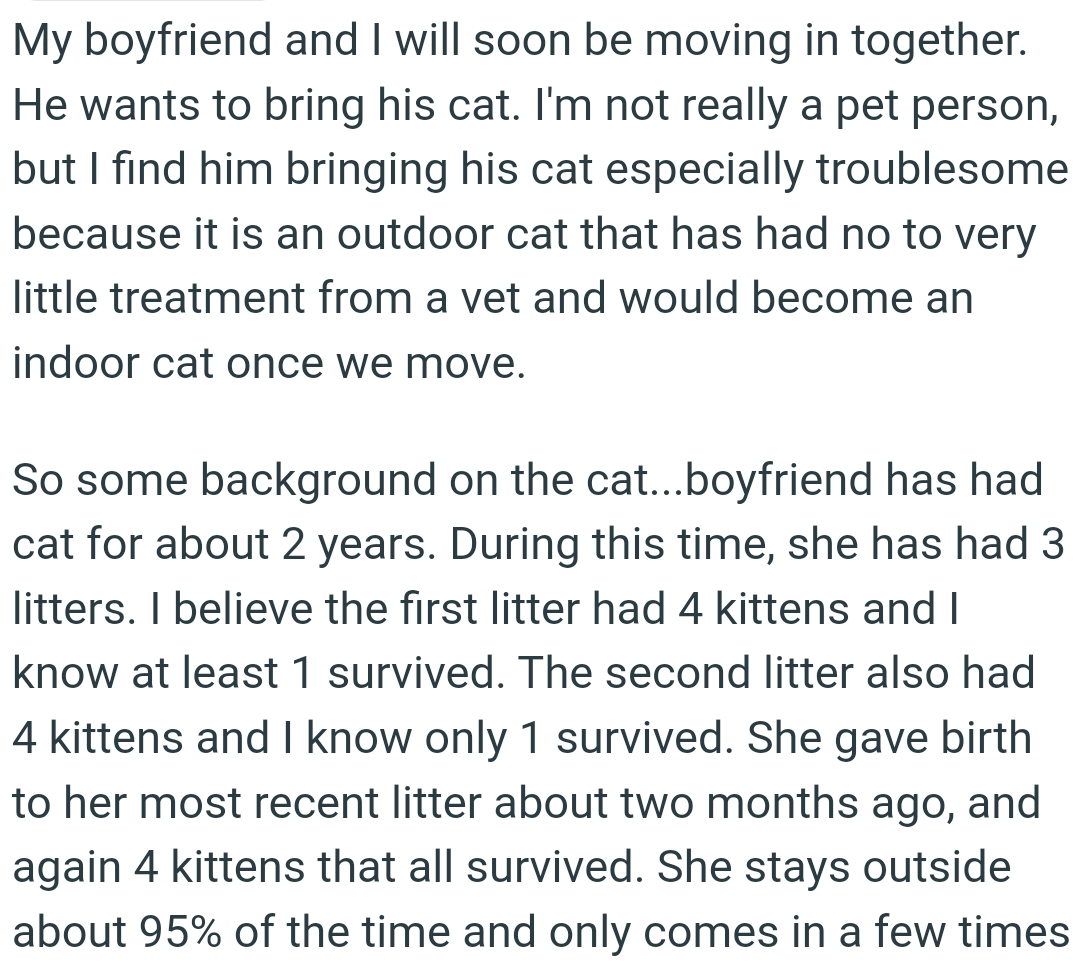
Understanding Vaccine Hesitancy in Pets
Dr. Sarah Thompson, a veterinary psychologist, explains that vaccine hesitancy often stems from a combination of misinformation and deeply held beliefs about health and safety.
Research indicates that pet owners may project their fears about medical interventions onto their animals, making them more resistant to vaccinations.
This projection can often be traced back to personal experiences or societal influences that prioritize natural over medical solutions.
The OP worries about how smoothly the cat's transition from outdoor cat to indoor cat will be
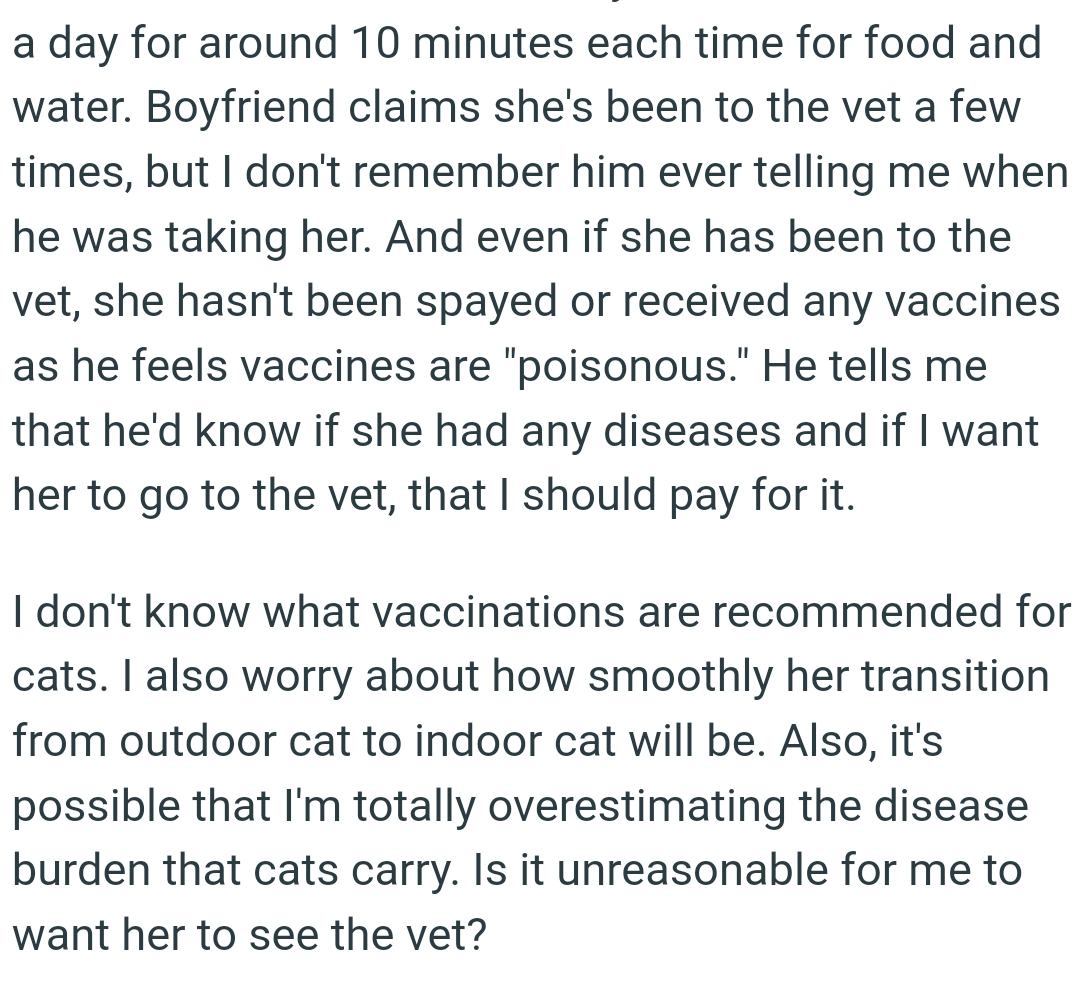
We've gathered some of the most upvoted comments from other Redditors for you to read through below
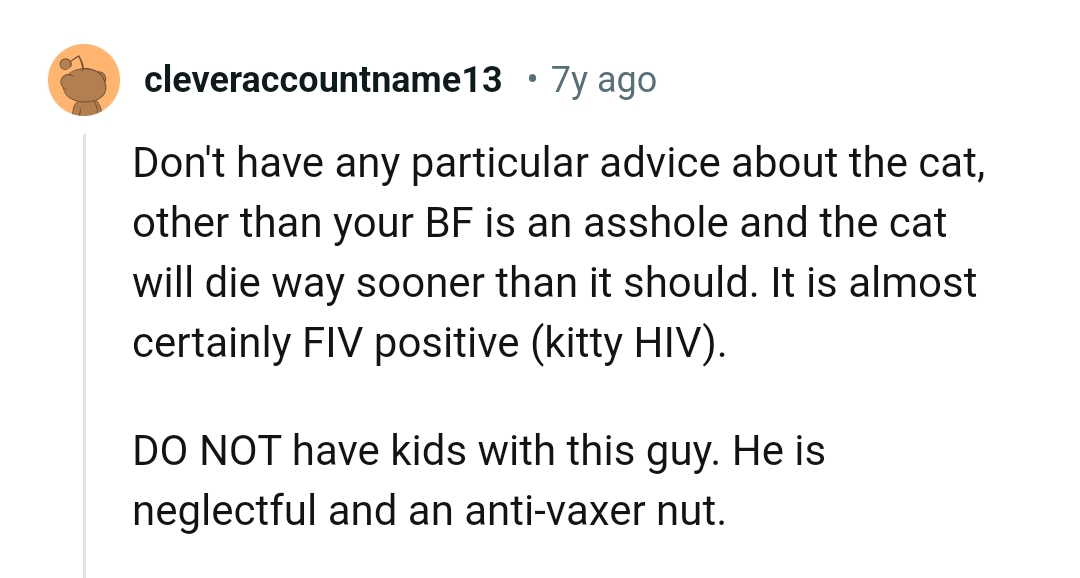
The OP dropped a summary just in case the story was too long to read
Moving to a new place with her boyfriend. He wants to bring his outdoor cat with him and make her an indoor cat. The cat hasn't been vaccinated or received much treatment from the vet.
This is a downright cruel thing to do
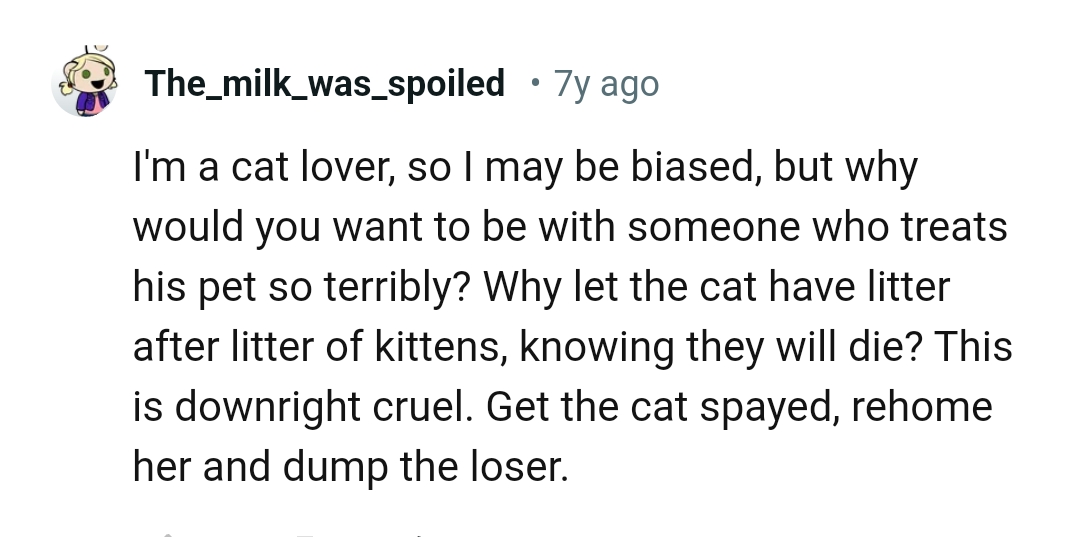
She should have been vaccinated for feline leukemia
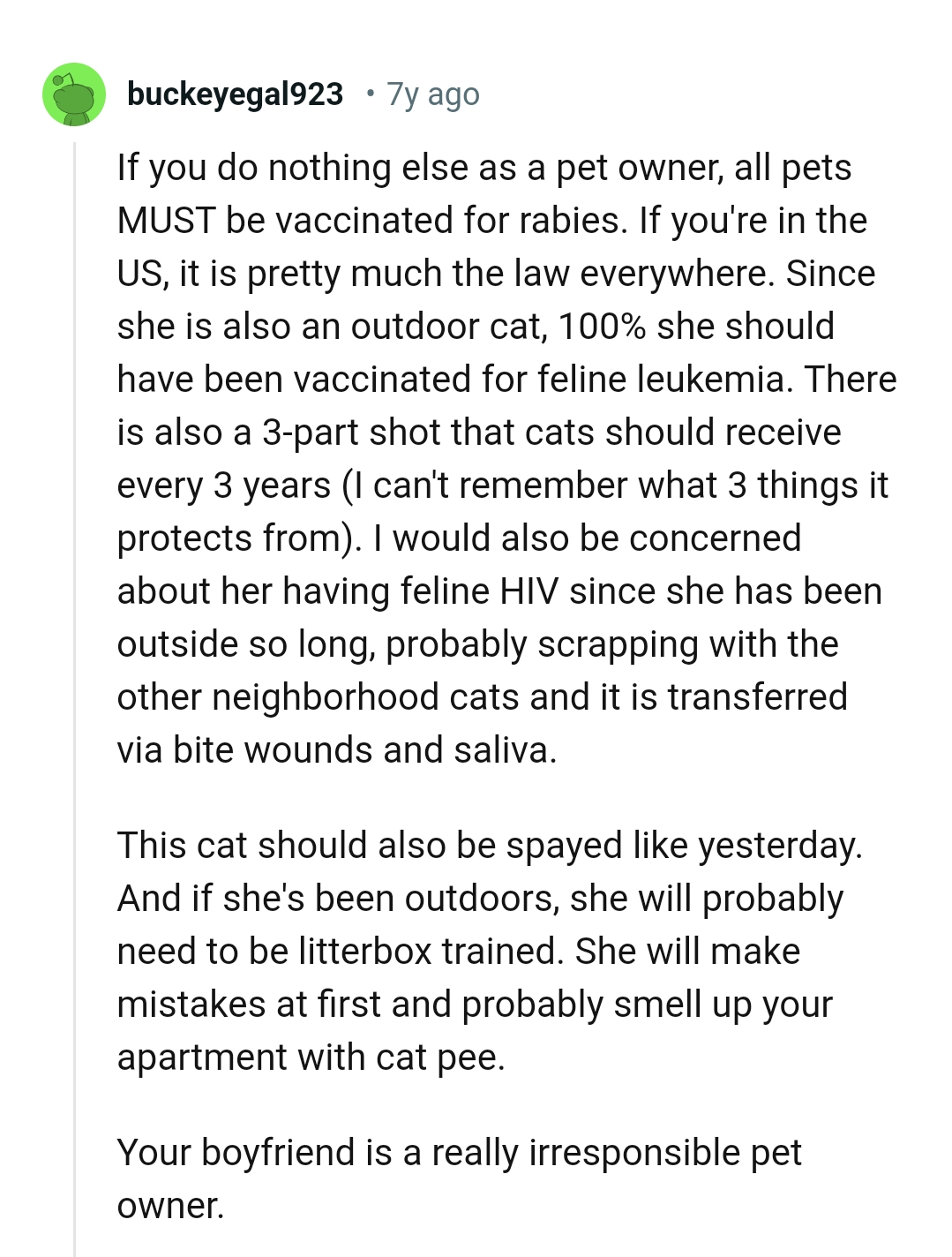
Studies show that the emotional bond between pet owners and their animals can complicate decision-making, particularly regarding health interventions. Dr. Susan David, an expert in emotional agility, notes, "When we anthropomorphize our pets, we often project our own fears and vulnerabilities onto them." This tendency can lead to an increased fear of potential side effects from vaccinations, which may seem more harmful than beneficial. For further insights, visit Susan David's professional website.
This Redditor is sure the cat hasn't been to the vet
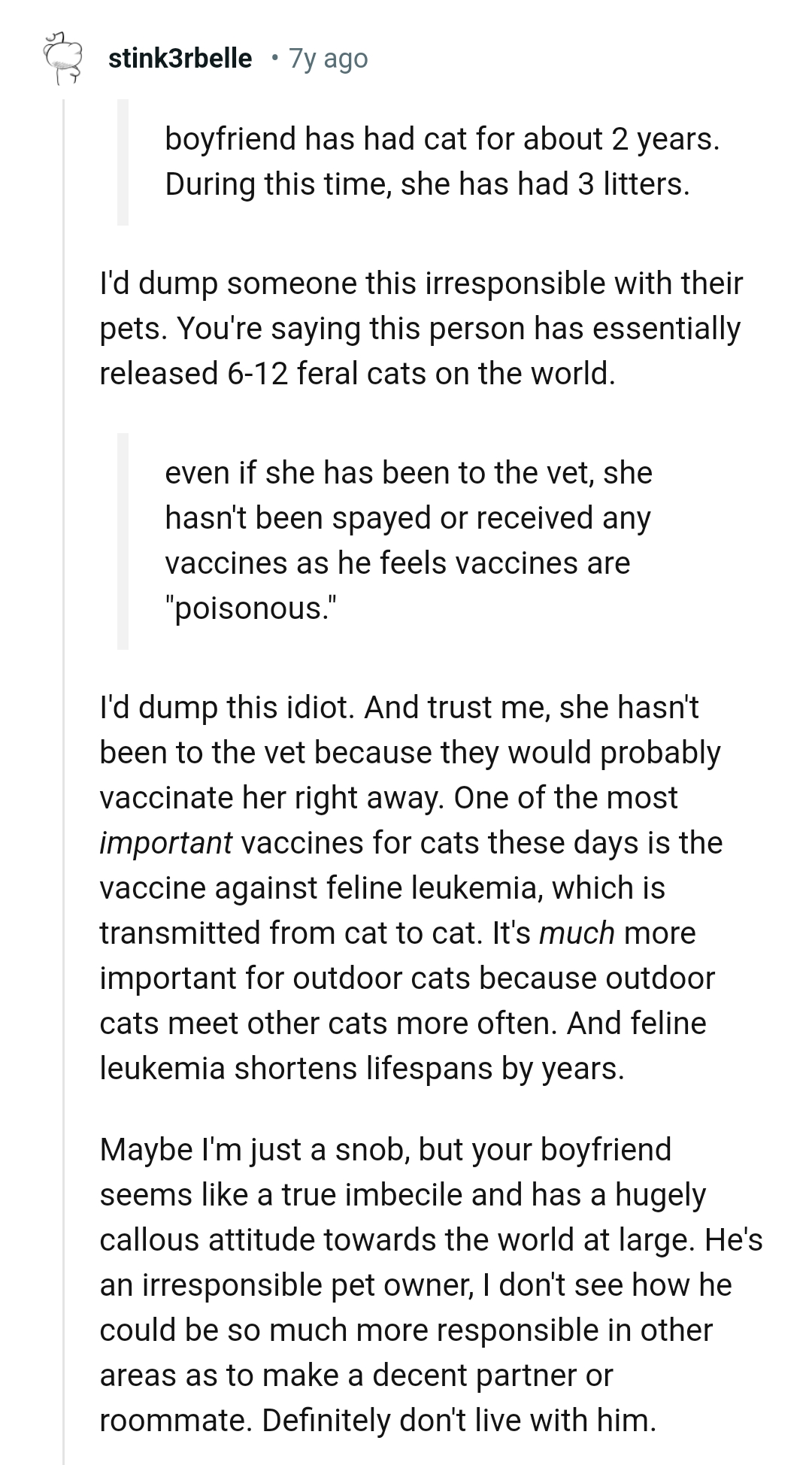
He might pull this exact thing with his kids
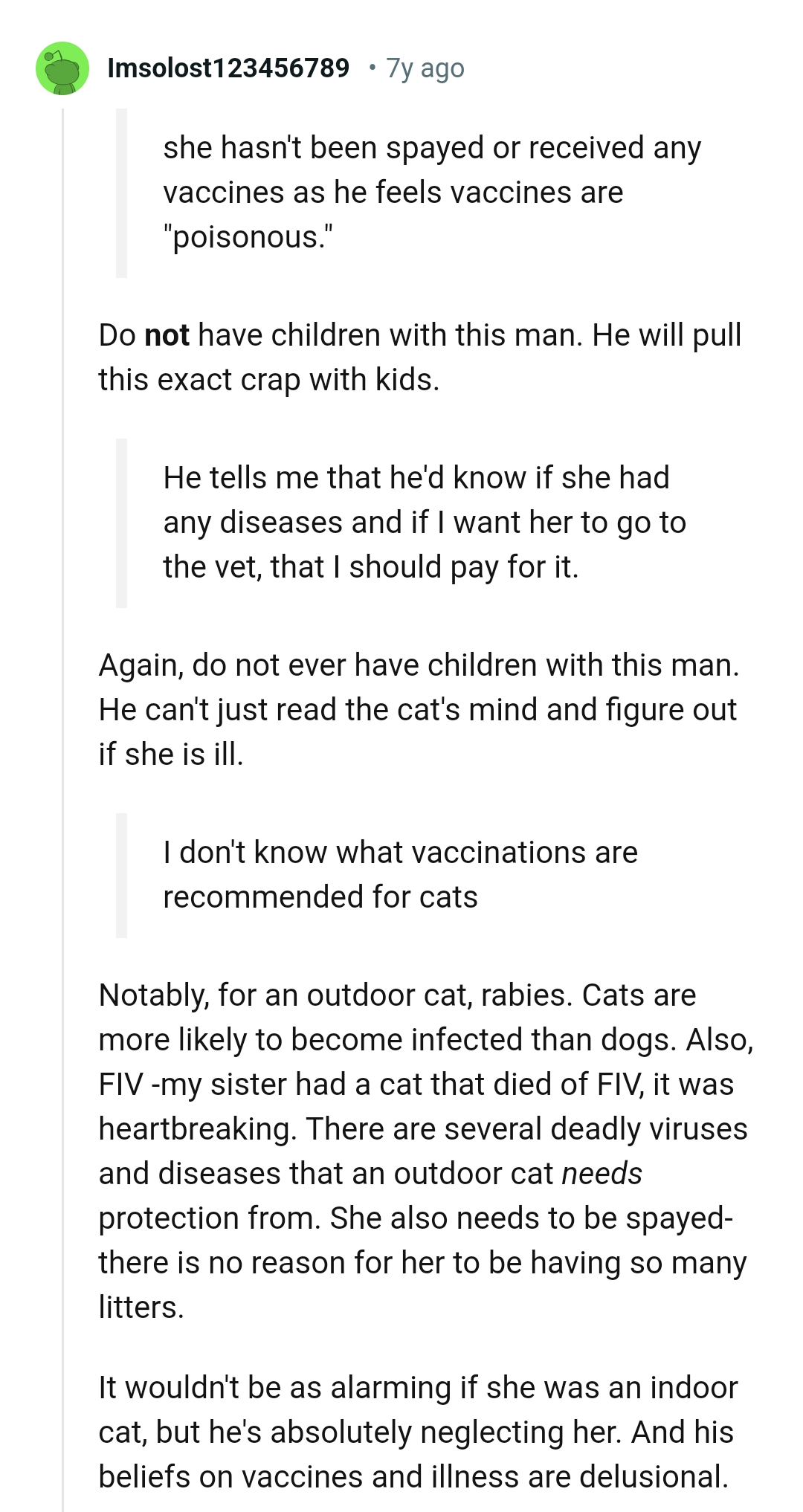
Navigating Differences in Pet Care Beliefs
When partners disagree on pet care, it can create tension in the relationship. A clinical psychologist highlights that these disagreements may arise from differing values and knowledge bases.
Couples therapy research indicates that effective communication strategies can mitigate conflict, helping partners express their concerns while also listening to one another.
Establishing a shared understanding is crucial, and this often requires patience, empathy, and a willingness to compromise.
OP's boyfriend is an irresponsible and neglectful cat owner
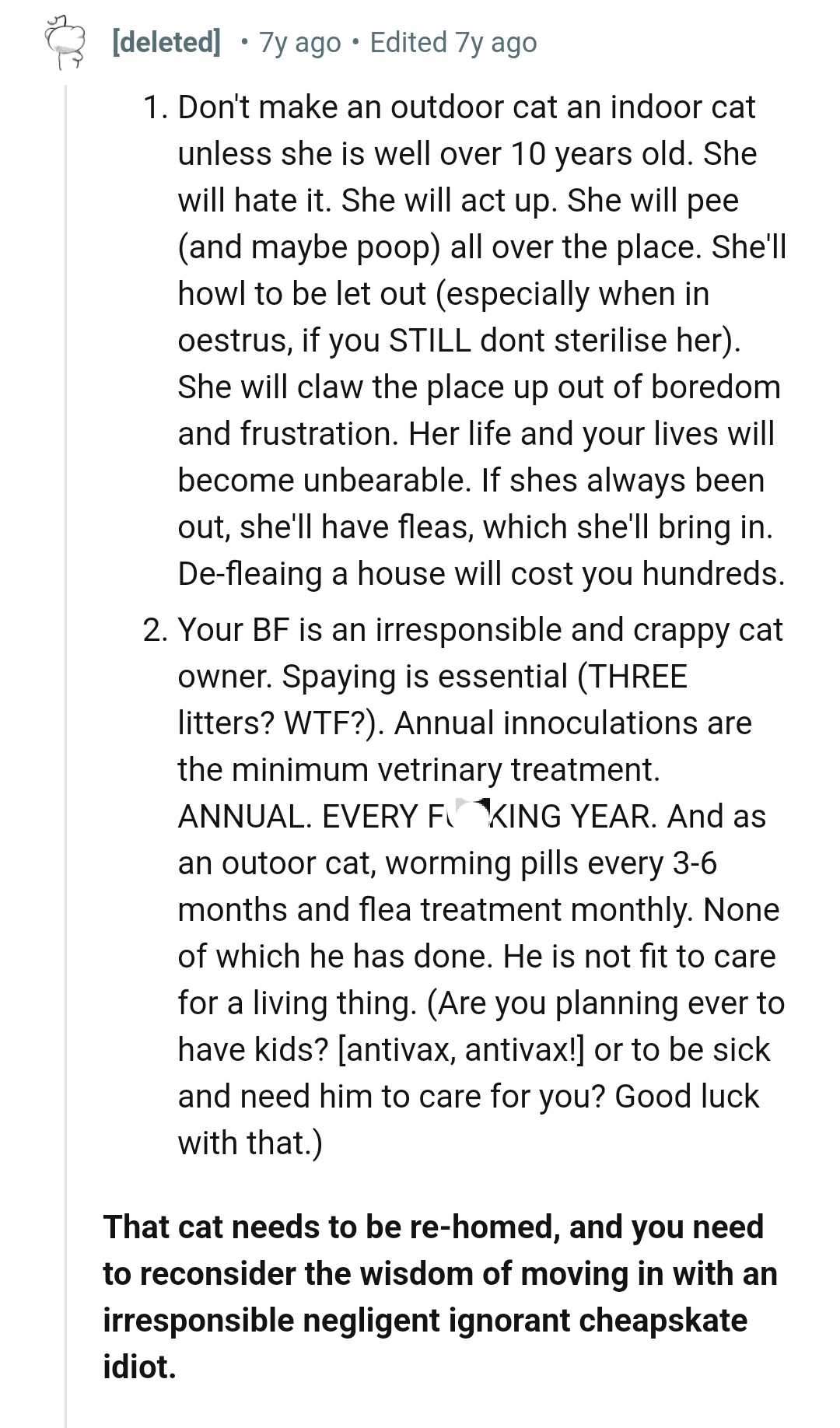
Only a blood test can detect if the cat has an infection
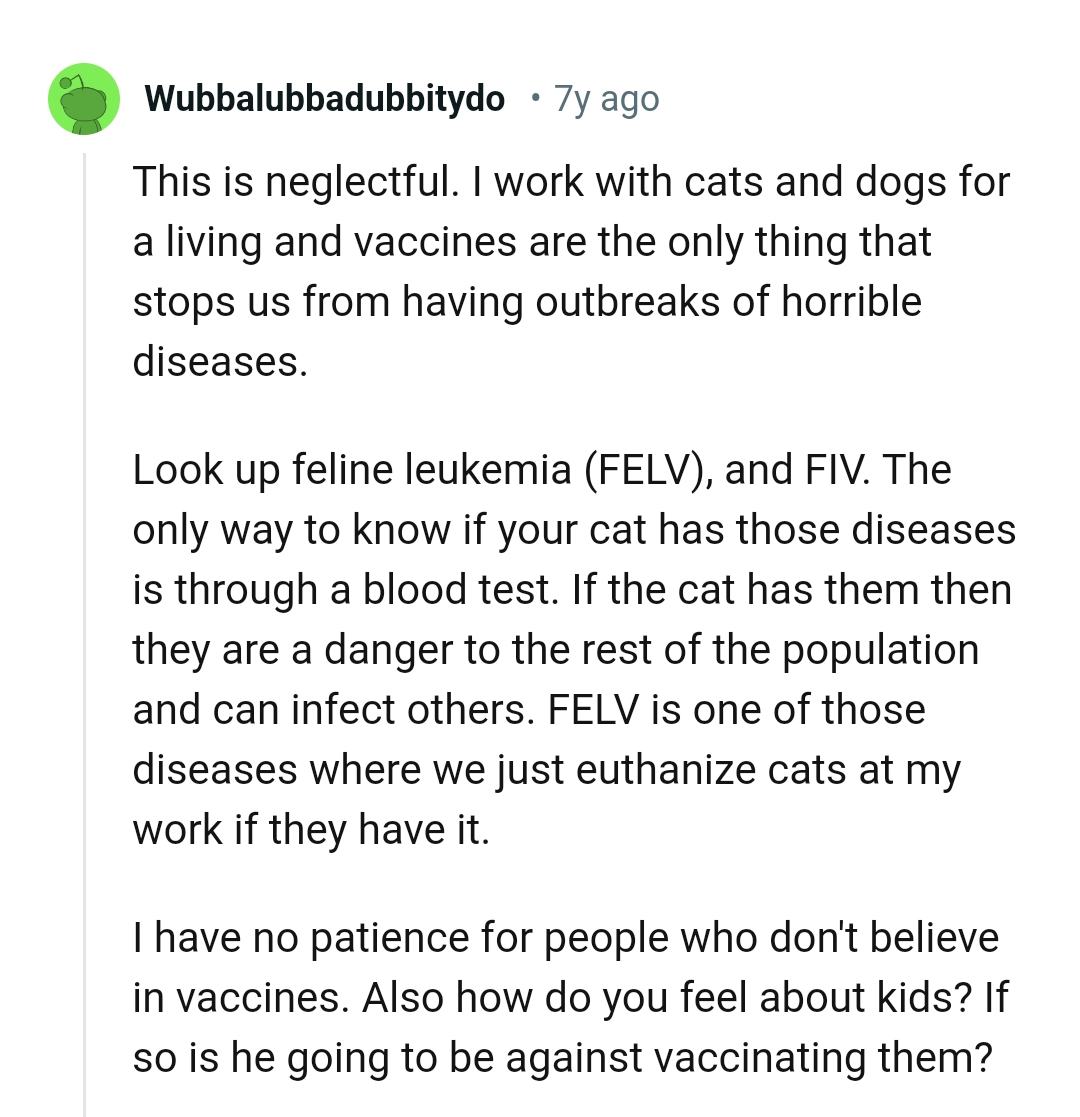
Behavioral research shows that when addressing conflicts over pet care, it can be beneficial to approach the situation collaboratively.
Exploring educational resources together, such as veterinary advice or credible online articles, can foster a sense of teamwork.
This strategy not only enhances knowledge but also strengthens the relationship by aligning both partners in a common goal of pet well-being.
He is irresponsible for not getting his cat spayed
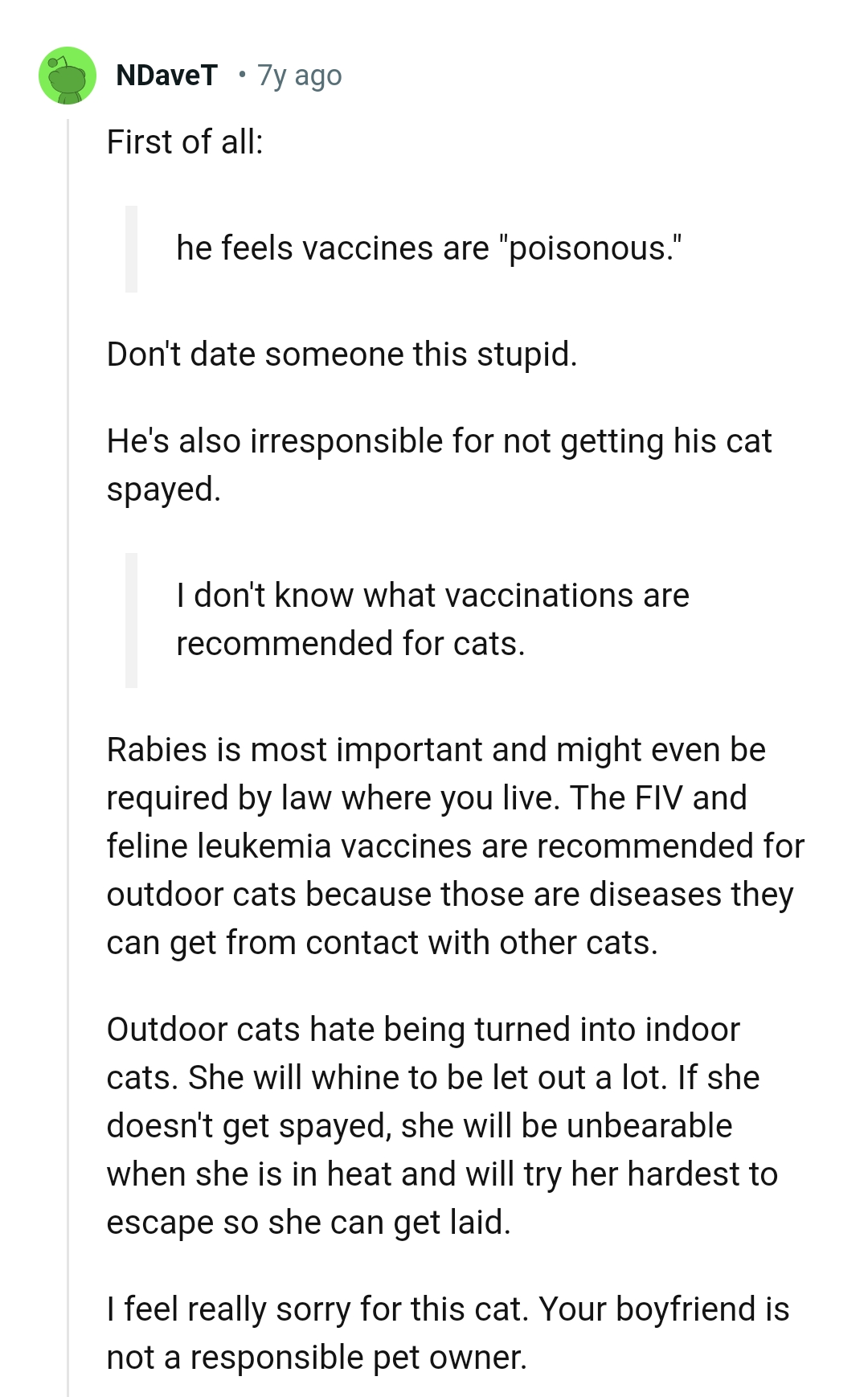
He's a bad person and a bad pet owner
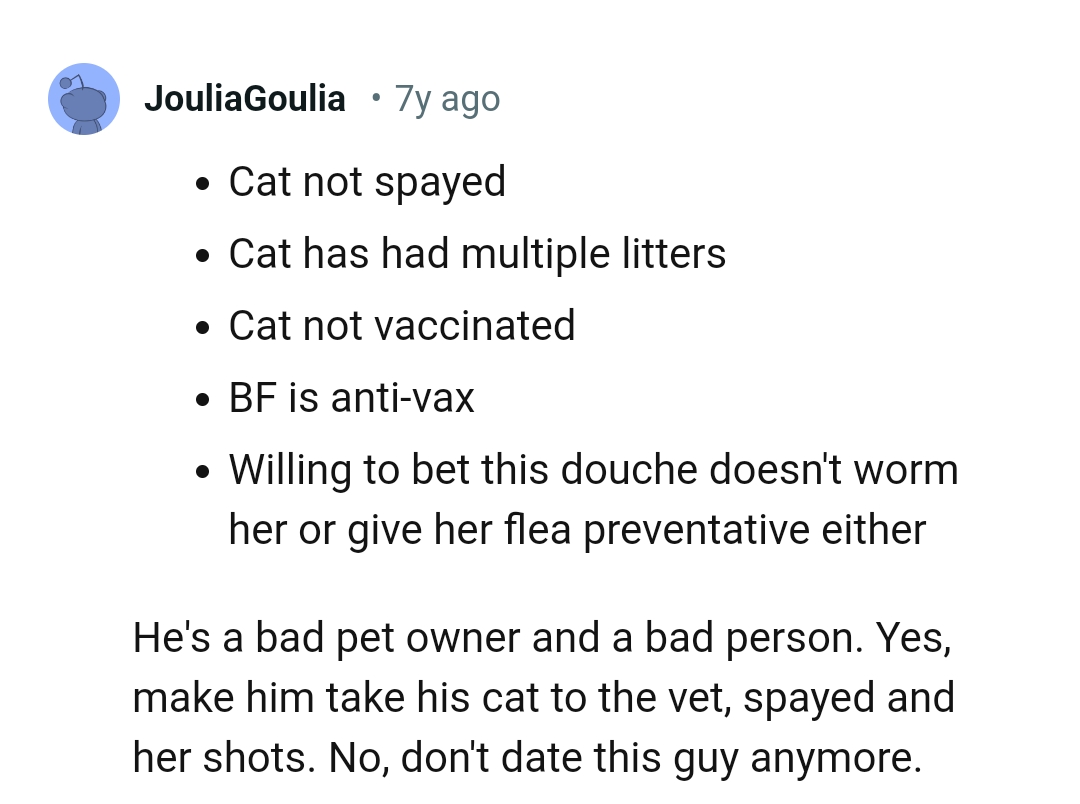
The best person to assess your cat's specific needs and determine which vaccinations are required and how frequently to administer them to provide your cat with the best protection is the veterinarian. The cat's vaccination schedule will be determined by its age, lifestyle, health, and the diseases prevalent in the area.
Yet this cat owner didn't want to vaccinate his cat, and Redditors were against such an act as it doesn't help the cat in any way.
Psychological Analysis
This situation illustrates how deeply personal beliefs about health can impact pet care decisions.
It's essential to recognize that these beliefs often have roots in past experiences and societal norms, which can complicate discussions about pet health.
Analysis generated by AI
Analysis & Alternative Approaches
Understanding vaccine hesitancy in pets and the emotional dynamics of pet ownership can lead to more informed decisions. As Dr. Ramani Durvasula, a clinical psychologist, states, "Open communication about pet care not only enhances the bond between pets and their owners but also fosters a deeper understanding of each other's concerns." This sentiment is echoed by the Playful Parenting website, which emphasizes that discussing pet health openly can lead to better outcomes for both pets and their families.
Understanding the Emotional Impact of Pet Ownership
Pet ownership can evoke strong emotional responses, including anxiety when it comes to health decisions.
According to studies in the field of human-animal interaction, pets often serve as emotional supports, and their health directly affects the owner's mental well-being.
Understanding the psychological significance of these attachments can provide insights into why decisions regarding pet care can become so charged.



